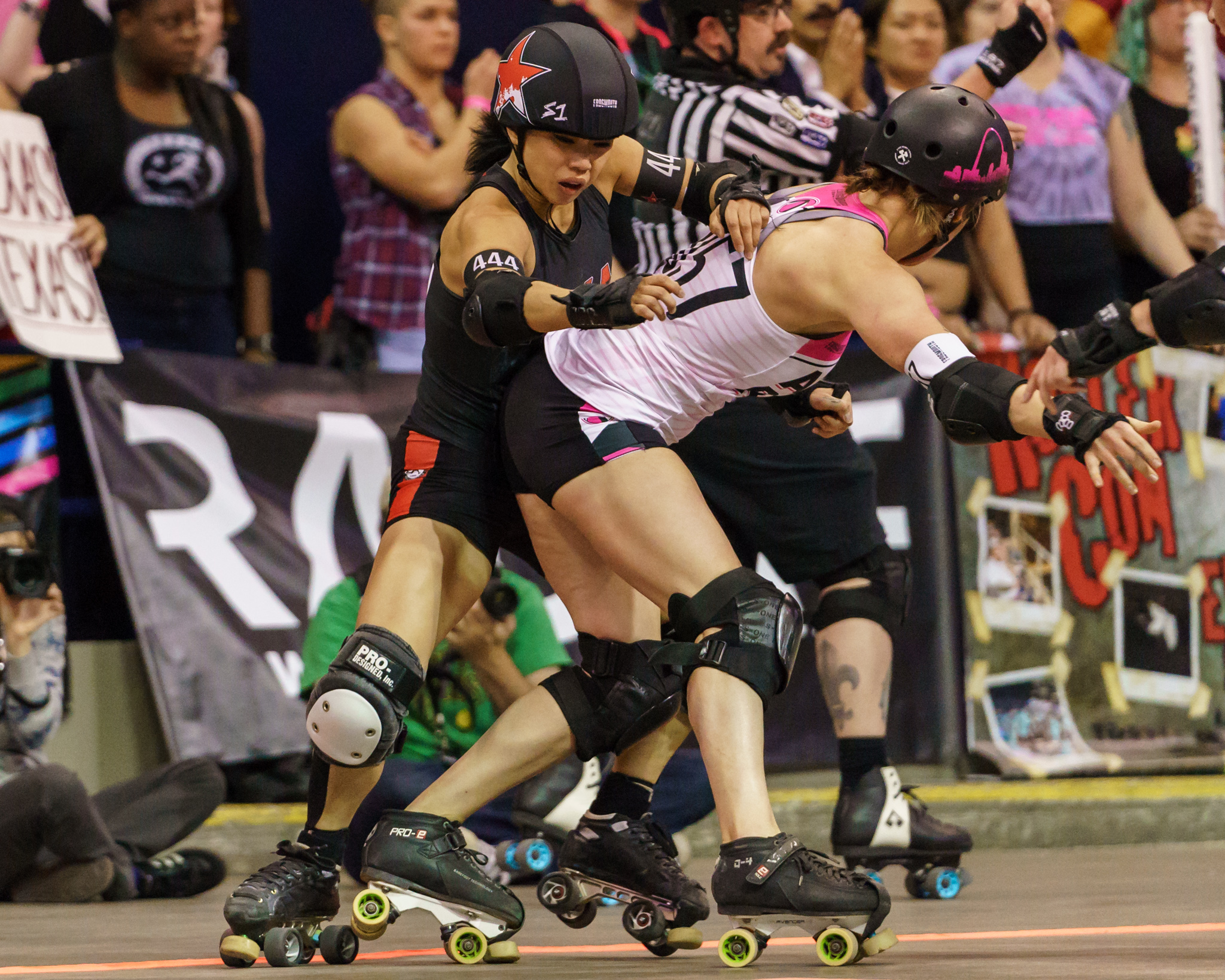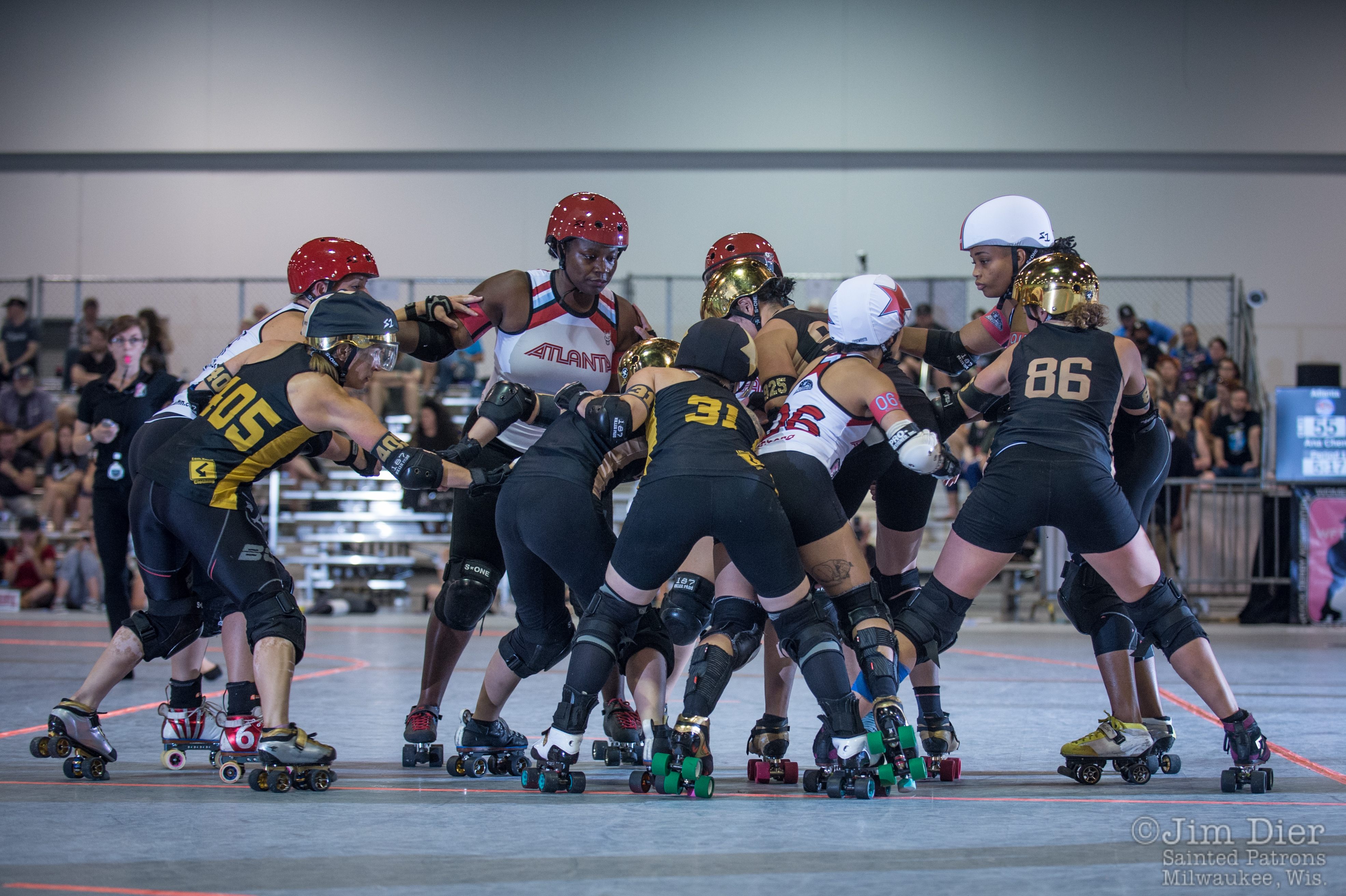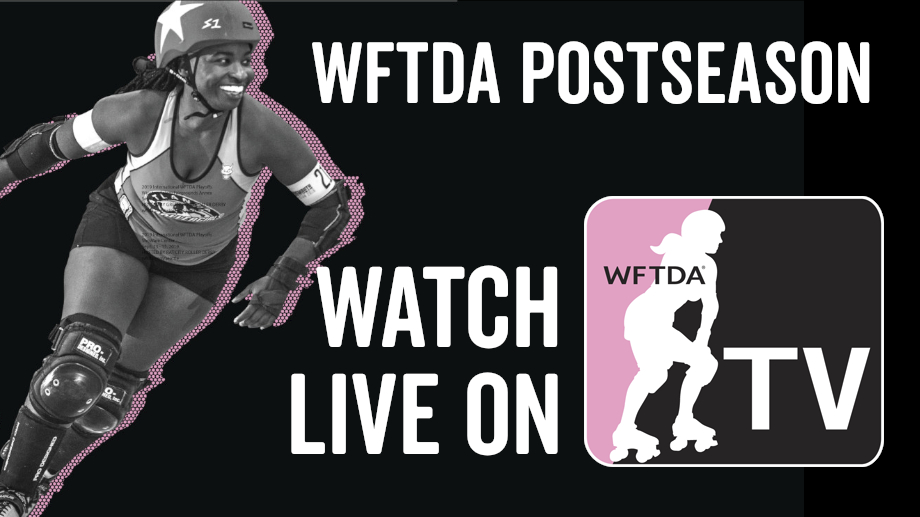Women’s Flat Track Derby Association Rolls Into REMI
WFTDA has the same economic pressures as all televised sports and at-home production is letting them do more with less
Story Highlights
At-home production workflow is migrating from the major leagues to other corners of sports media. The latest of those is the Women’s Flat Track Derby Association (WFTDA), which switched this season from full onsite production utilizing audio and video systems in a flypack, to microphones and cameras at the venue mixed and switched remotely by Blaze Streaming media, the broadcast vendor since 2009 for the sport’s main governing body. The new at-home-production/REMI (remote integration) approach will also be applied to post-season playoffs starting Sept. 6.

Arch Rival Roller Derby blocker (white) attempts to knock out the Texas Rollergirls (black) jammer on the outside line during the 2018 International WFTDA Championships in New Orleans. Photo credit: Keith Bielat
“We’re a big advocate of REMI,” says Joe Christensen, president and live-event web producer for Blaze Streaming Media. “We did 72 hours of the season kick-off live to Twitch and it was rock solid.”
Christensen says the onsite technology complement was basic: House and ambient audio are fed into Dante AVIO adapters and the two announcer (color and play-by-play) Audio-Technica BPSH-1 headsets are captured with Studio Technologies Model 205 Announcer’s Consoles. Onsite audio inputs are mixed with a Behringer X32 digital mixer. Each Sony PXW-x-70 Handycam receives program audio from the X32 via Dante AVIO Analog XLR output adapters. This allows for exact audio sync between multiple video sources. Video is backhauled using LiveU LU300 HEVC field encoding units and received by the LiveU LU2000 bonded video transceiver in the Portland control room. Content is switched using a NewTek TriCaster 460 and a NewTek 3Play 425 is used for replays. The weekend matches, known in the sport as bouts, are streamed as PPV events.
“In terms of the products used, this is sports at an amateur level,” says Christensen. “But it still gets the same benefit from applying REMI techniques to the production that an ESPN or Fox Sports would.”
That includes needing only a single manager on site, a director who also sets the initial audio mix into the console and lets Portland tweak that as needed. The director communicates with the two camera operators onsite through Studio Technologies AoIP-enabled Model 372A intercom beltpacks over Clear-Com’s LQ AoIP interfaces. IFB to the talent is also through the onsite console.
Master control does video switching remotely through the TriCaster and mixes the audio through its own X32 console, whose movements, such as fader-level adjustments and mutes, are mimicked on the on-site audio desk.

Atlanta Roller Derby (white) line up against Jacksonville Roller Derby (black) before the jam gets started during the 2018 International WFTDA Playoffs in Atlanta. Photo credit: Jim Dier
Christensen says that the technology does become slightly more sophisticated as the season progresses. They are now experimenting with JVC half-inch, three-chip cameras, and the number of cameras per show will double to four as they get closer to season final bouts. Those late-season and championship bouts have been shown delayed on ESPN2 and streamed live on ESPN3, with BBC Sport also taking several games during that period.
The organization says it intends to apply these at-home production techniques when the league’s international playoffs begin in Winston-Salem Sept. 6, through the second playoff round in Seattle Sept. 13-15. Those bouts, as well as the WFTDA Championships Nov. 15-17 at Complexe Sportif Claude-Robillard, in Montréal, Québec, will be on the organization’s PPV platform, with some also featured on Twitch.tv. Since 2004, the W.F.T.D.A. has grown to include 463 member leagues in 33 countries. Last year’s W.F.T.D.A. world championships, in New Orleans, drew 2,500 spectators.
Budget Is Everything
Budget is everything at this level of production, says Christensen, citing the use of the LiveU ecosystem at 720p, which helps hoard bandwidth. But REMI provides the big savings this season, and will provide even more next year, when he says they will have no staffers on site, only a local A2.
 “The reduction of travels costs — airfares, hotels, per diems — is enormous at this level, especially when you extend that to bouts overseas,” he explains. The league, which is a nonprofit organization, usually does one or two bouts each season in Europe — this year it will be Helsinki — and the championships (after a lengthy playoff series worthy of an NHL post season) will be played in Montreal.
“The reduction of travels costs — airfares, hotels, per diems — is enormous at this level, especially when you extend that to bouts overseas,” he explains. The league, which is a nonprofit organization, usually does one or two bouts each season in Europe — this year it will be Helsinki — and the championships (after a lengthy playoff series worthy of an NHL post season) will be played in Montreal.
It will be some time before what had been known as roller derby reaches the heights it did during the mid century. In 1973, 27,135 fans packed into Shea Stadium to watch the sports’ triple-header world championships. But now roller derby — Ben Doyle, the live broadcast operations manager for the WFTADA and technical director for Blaze Streaming, says the term remains politically correct— is transitioning from the spectacle it once was in the 1950s through the mid ‘70s to a more conventional sport, one that is looking for its place in the increasingly broad line-up of sports on screen.
“On one hand, the shows are like training videos for those who want to participate in the sport, and for the fans, but they’re also done in a very professional manner, with quality announcer talent and good production values,” says Doyle. Though he says they have to accommodate ESPN’s technical requirements as best they can when they’re carried by the cabler, it’s not going to become a sport with time outs for scheduled commercial breaks. But that’s fine: “With streaming, the sky’s the limit, because we’re not constrained by broadcast metrics. We can make the show work for our audiences.”
However, says Christensen, the sport can now leverage the same at-home-production technology that every other sport does for its telecasts.
“REMI represents the ability to do more complex productions in the future and to cover more events,” he says. “The WFTADA is looking to do more bouts this year because of the savings we get from REMI. I could not be a stronger advocate for doing production that way.”
